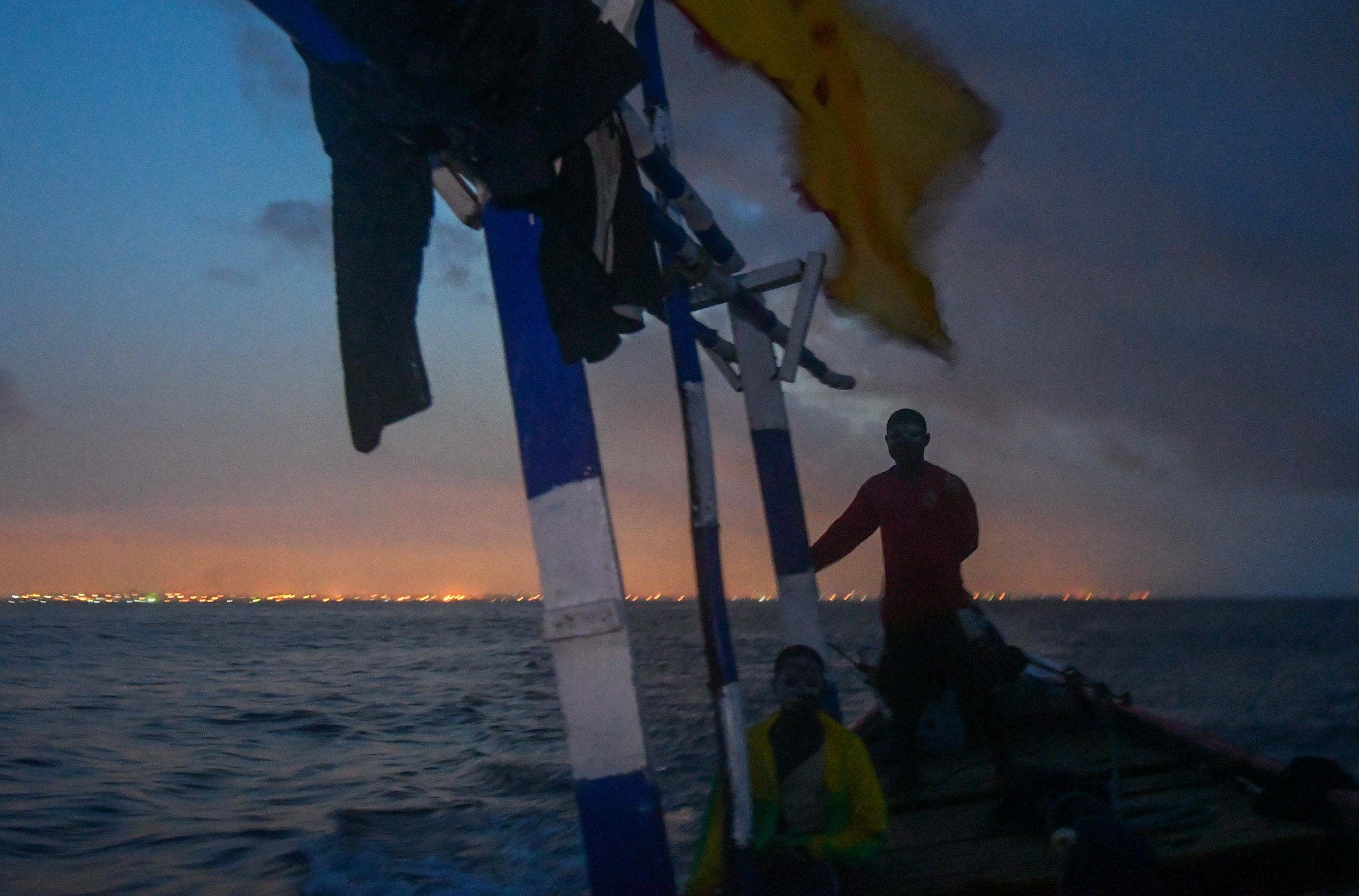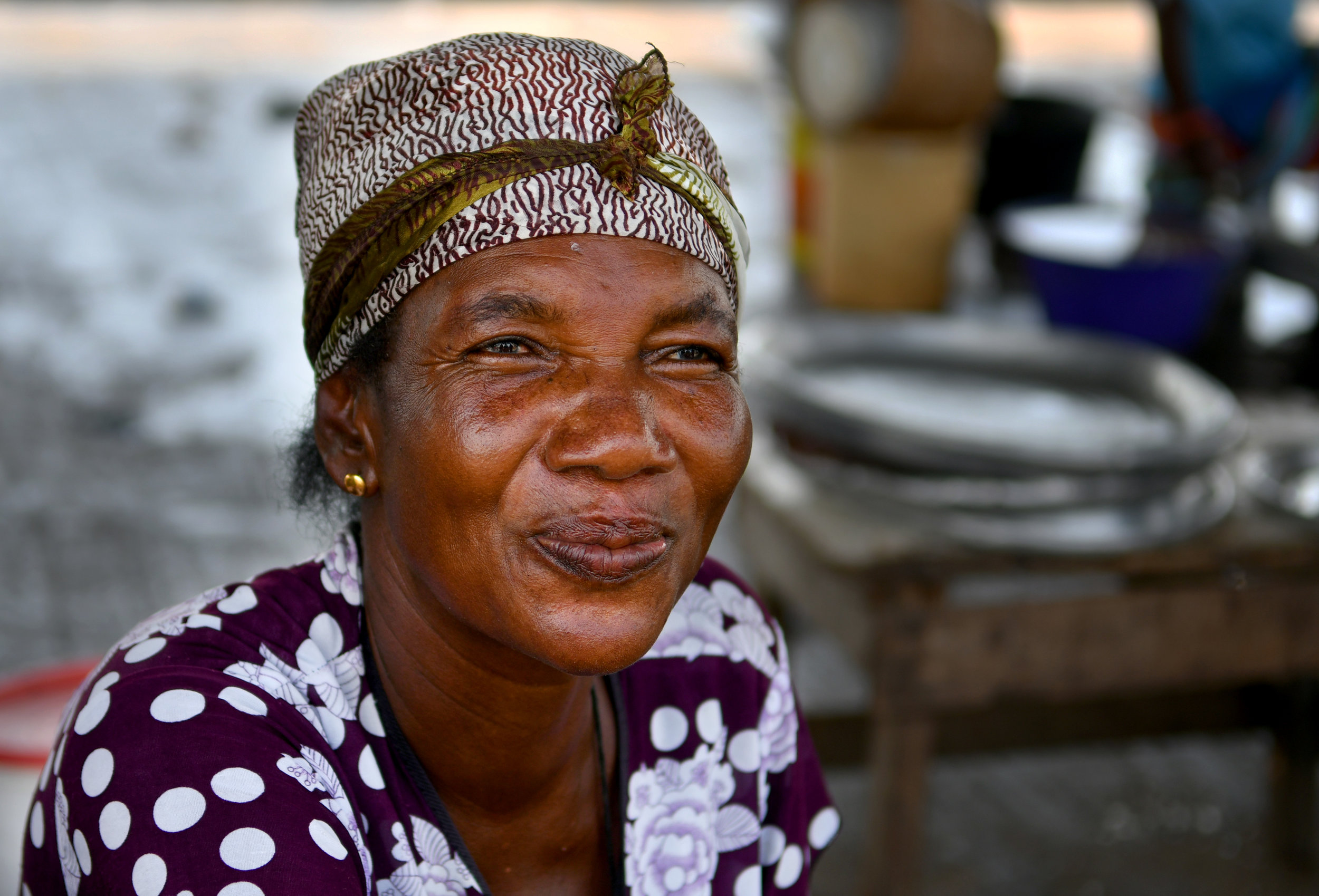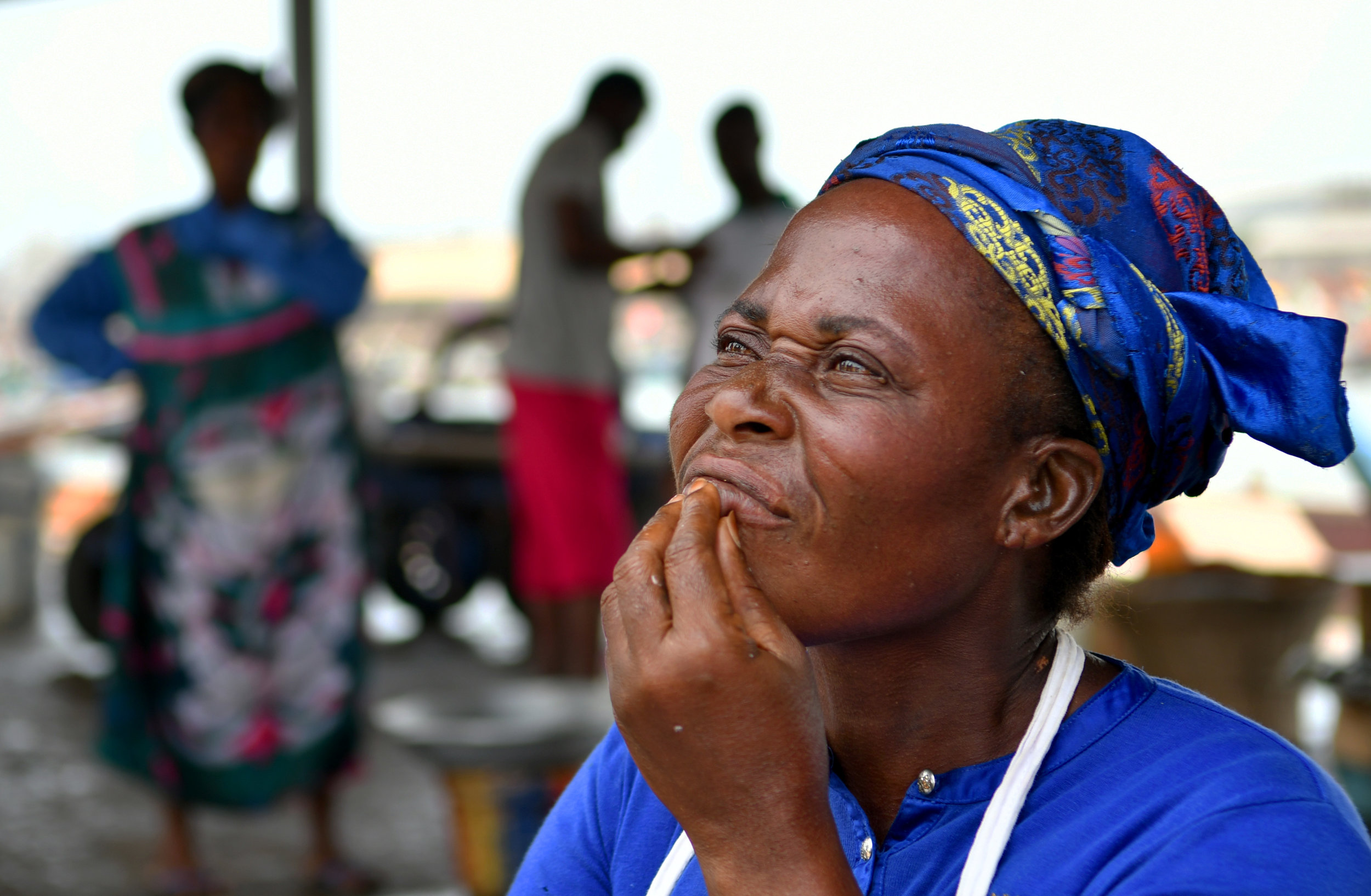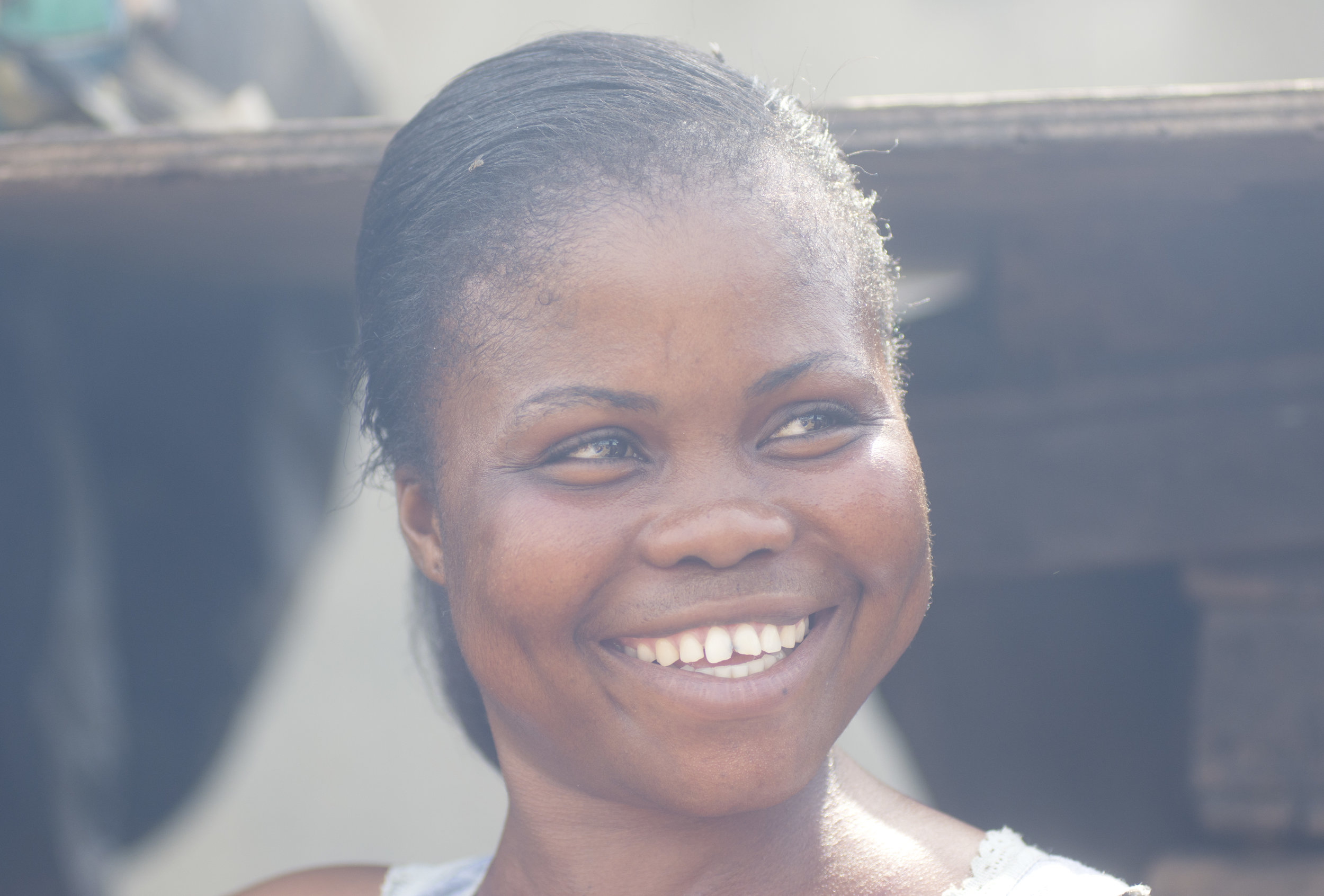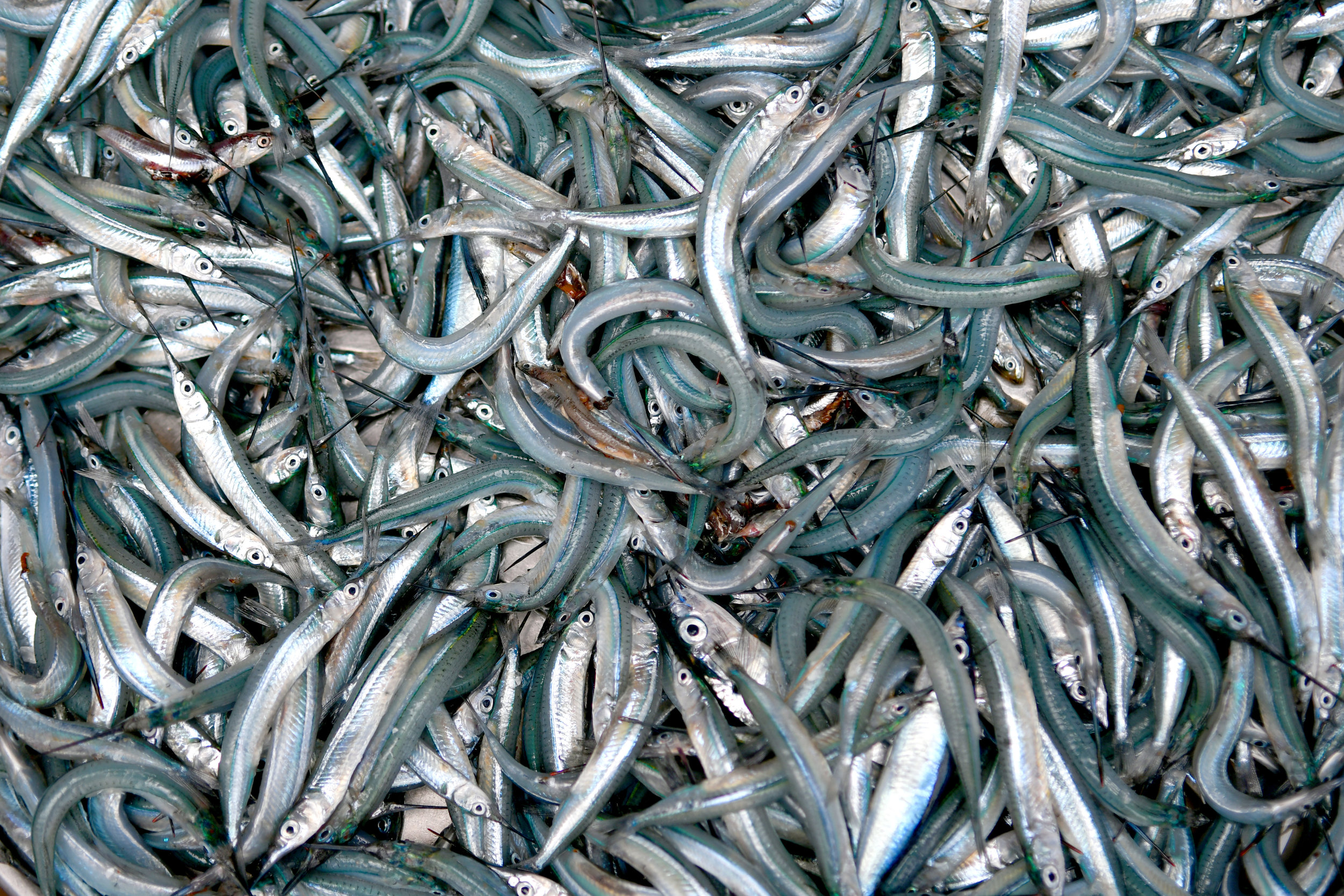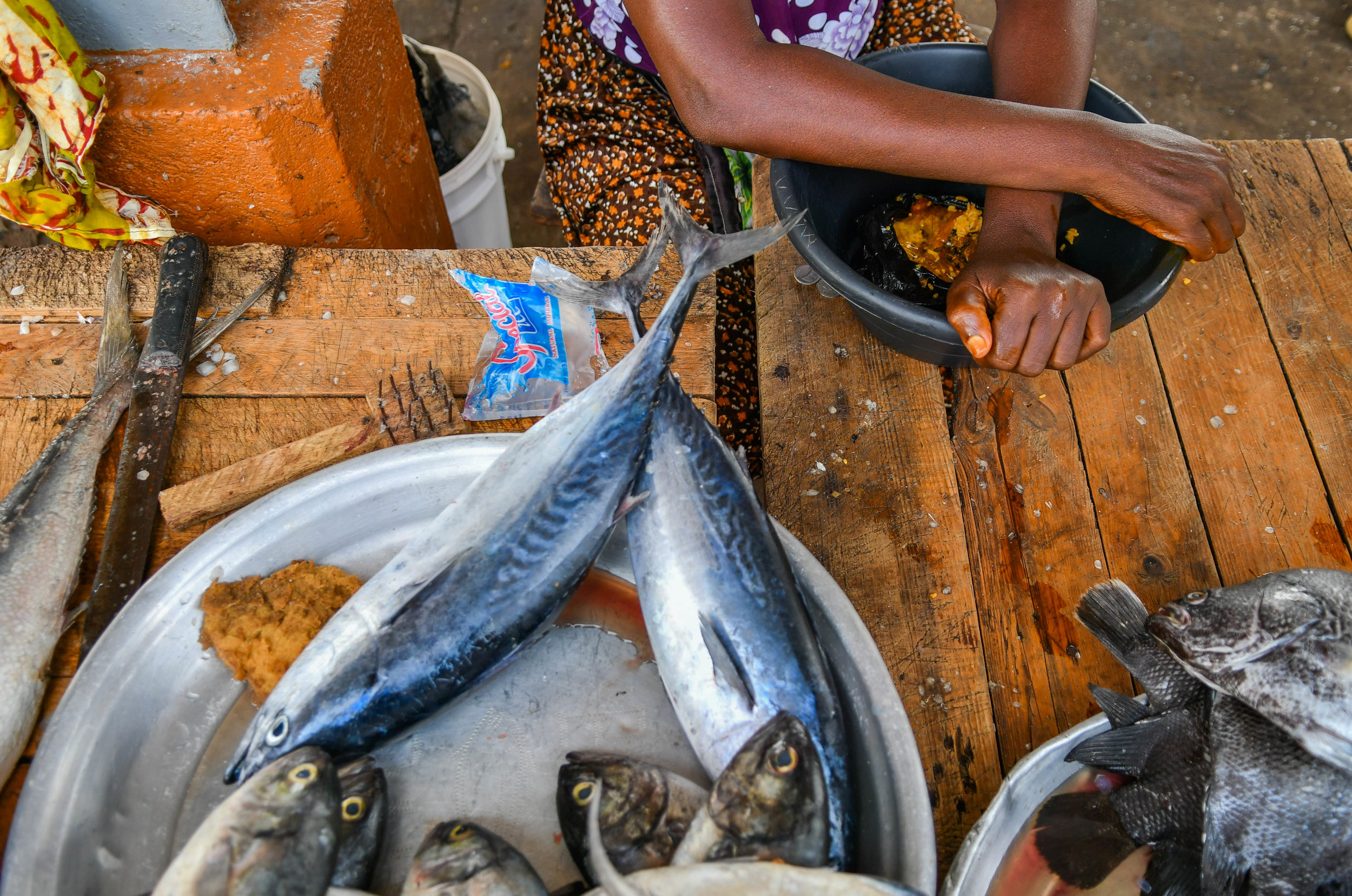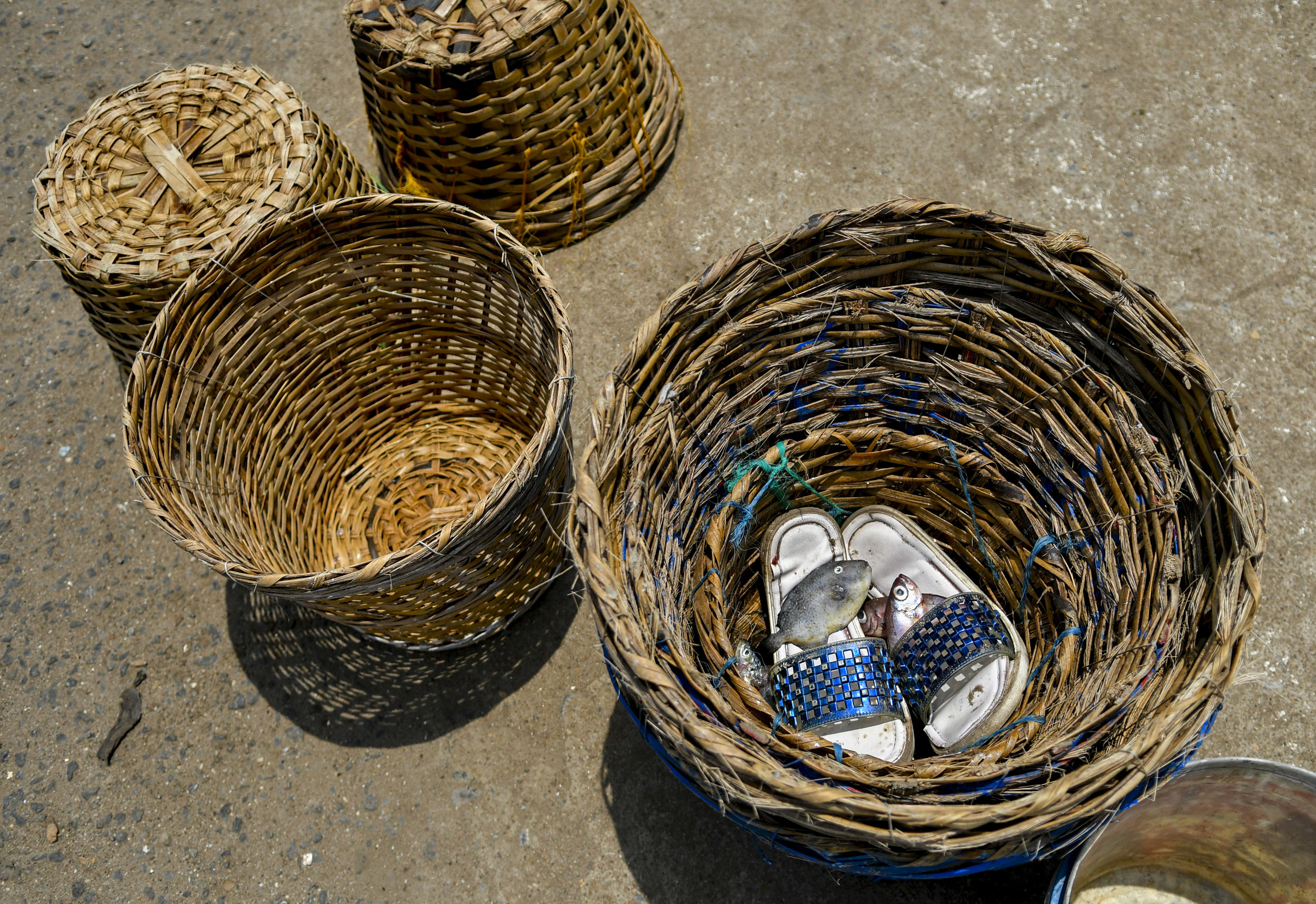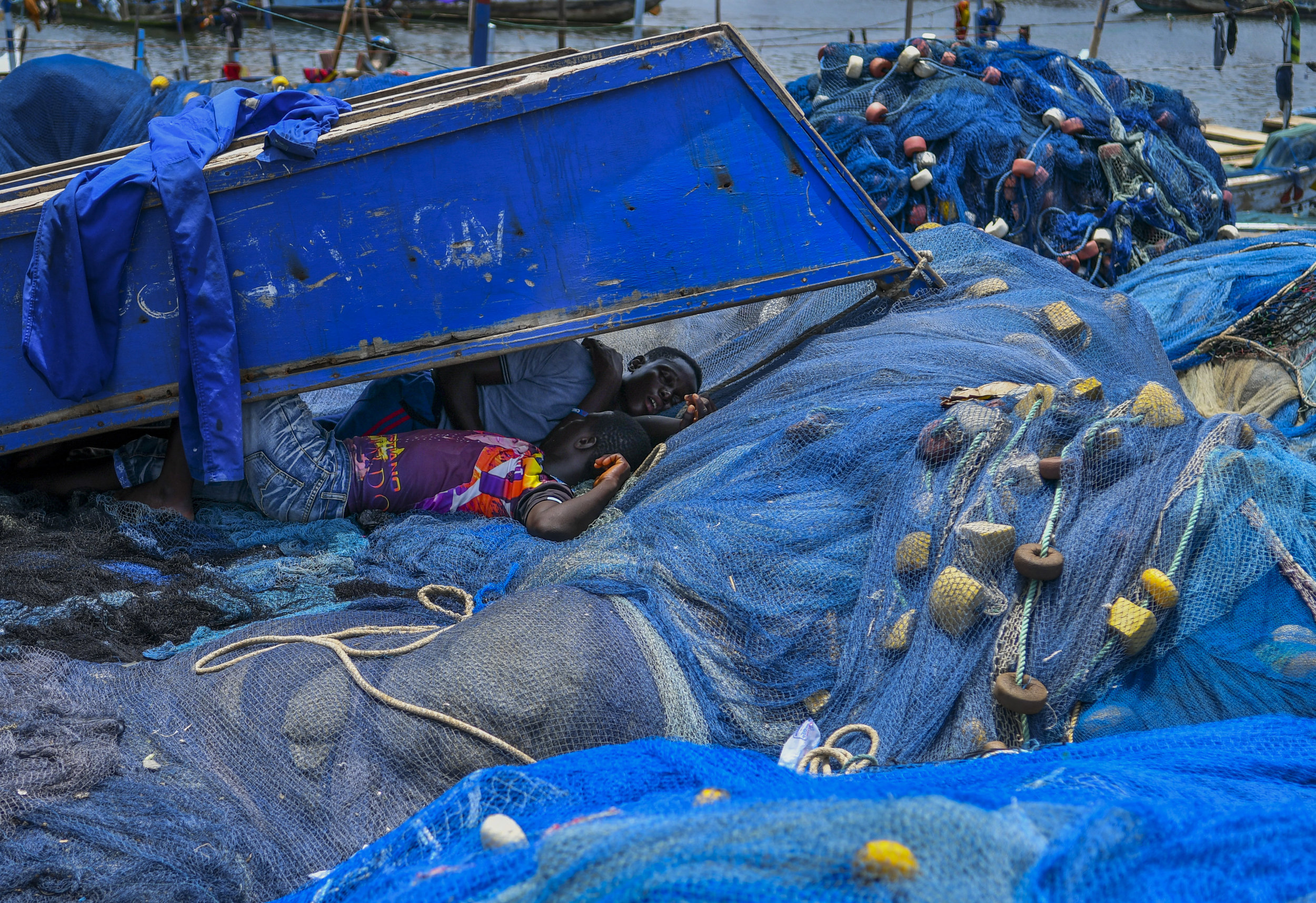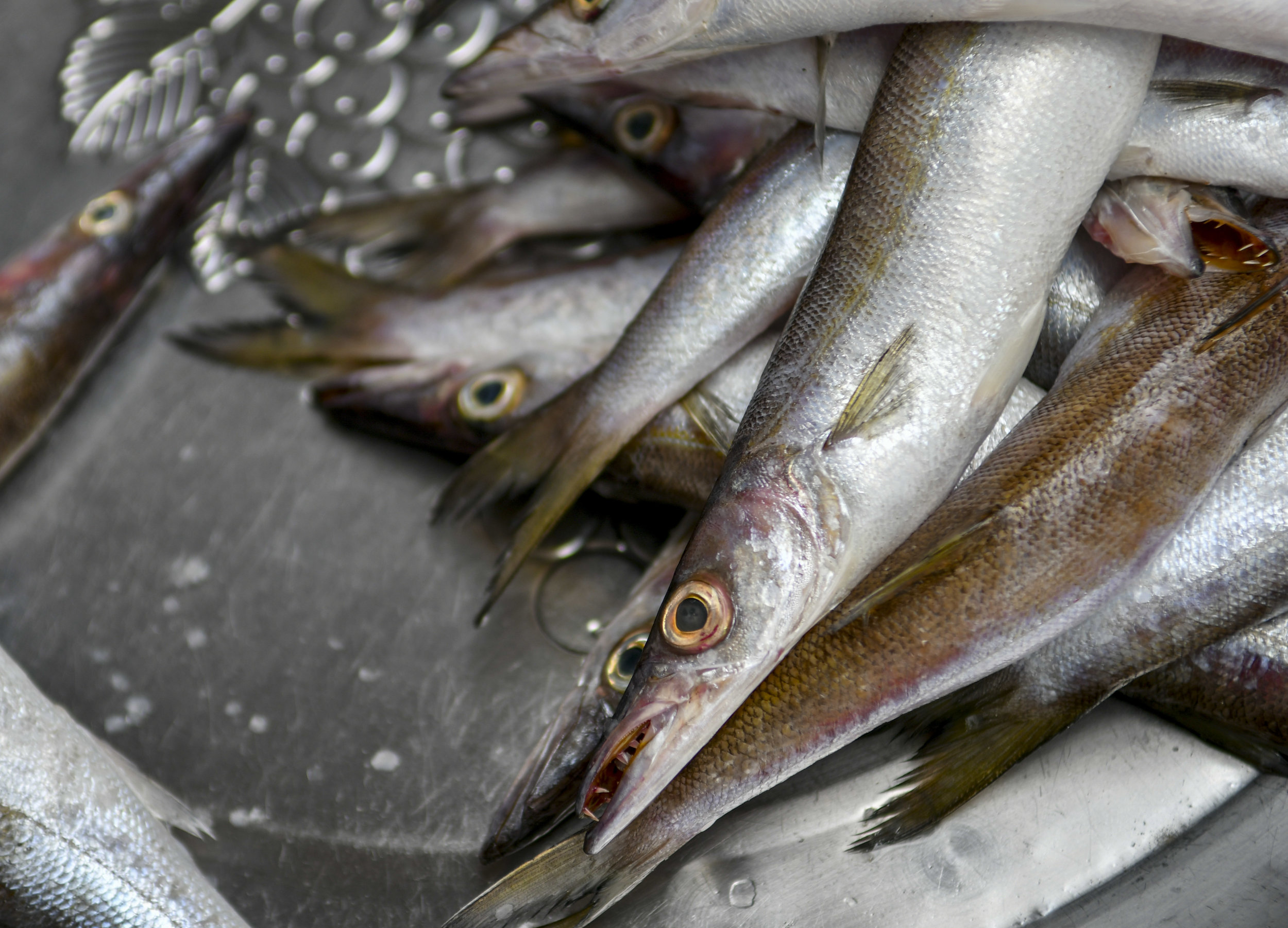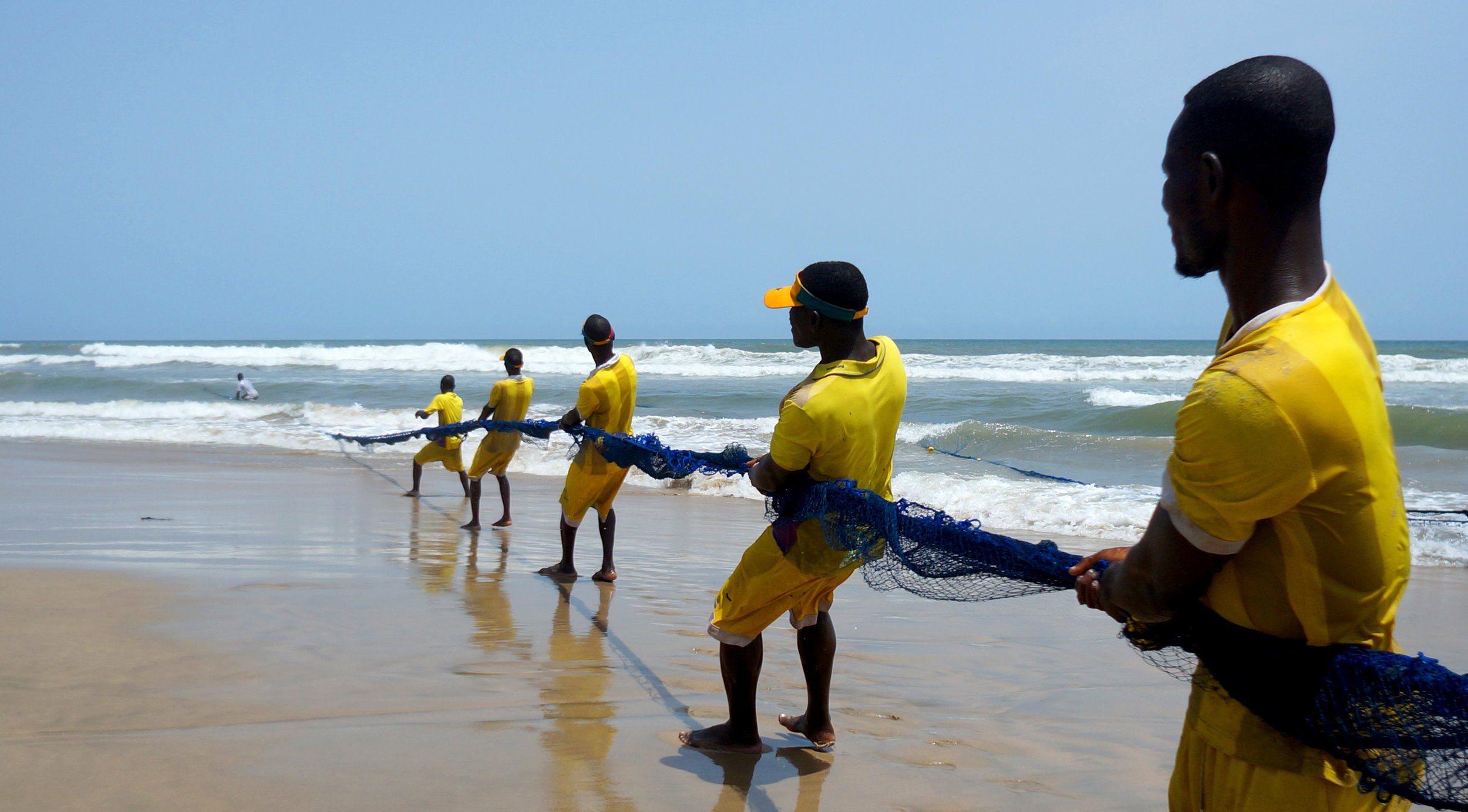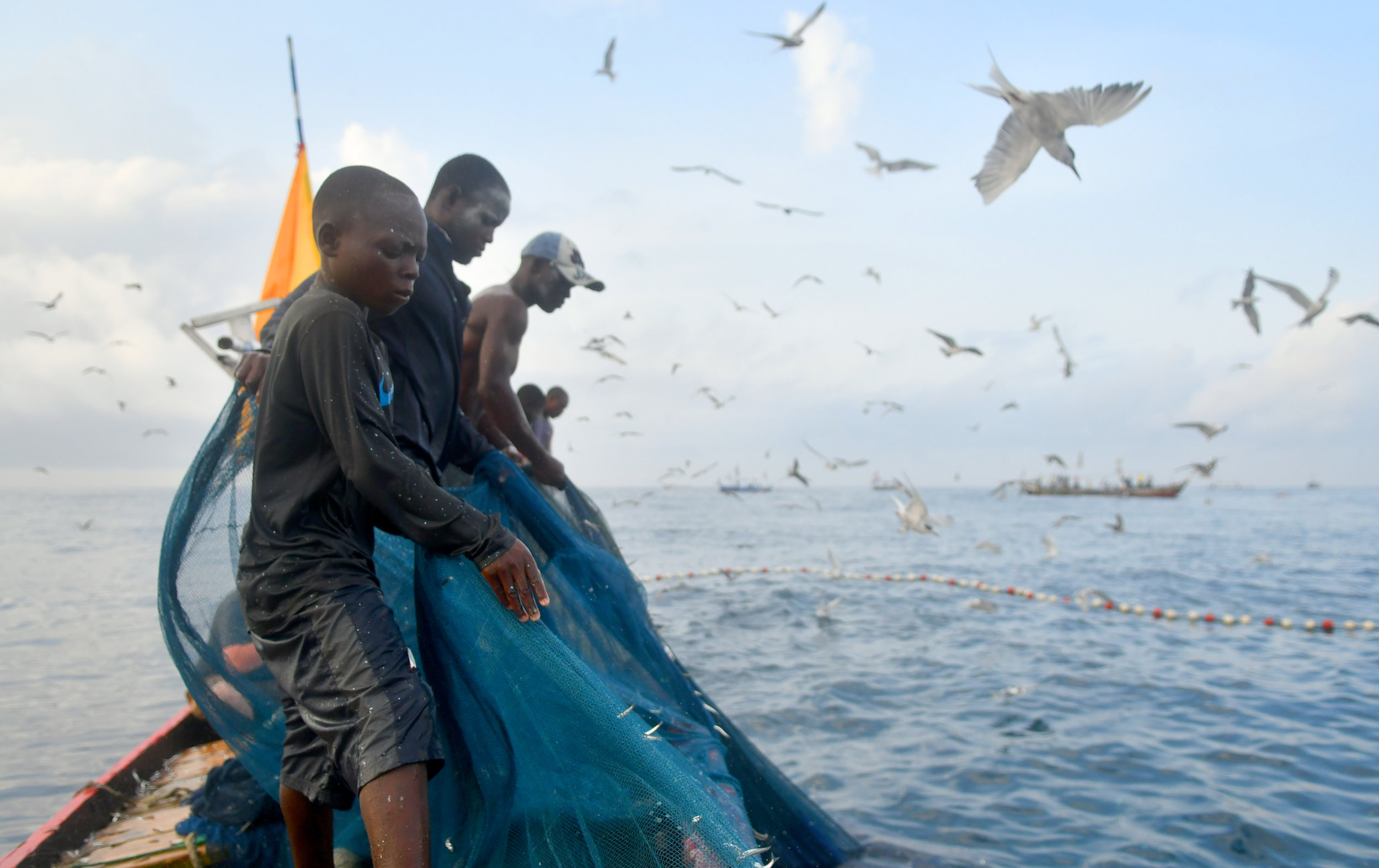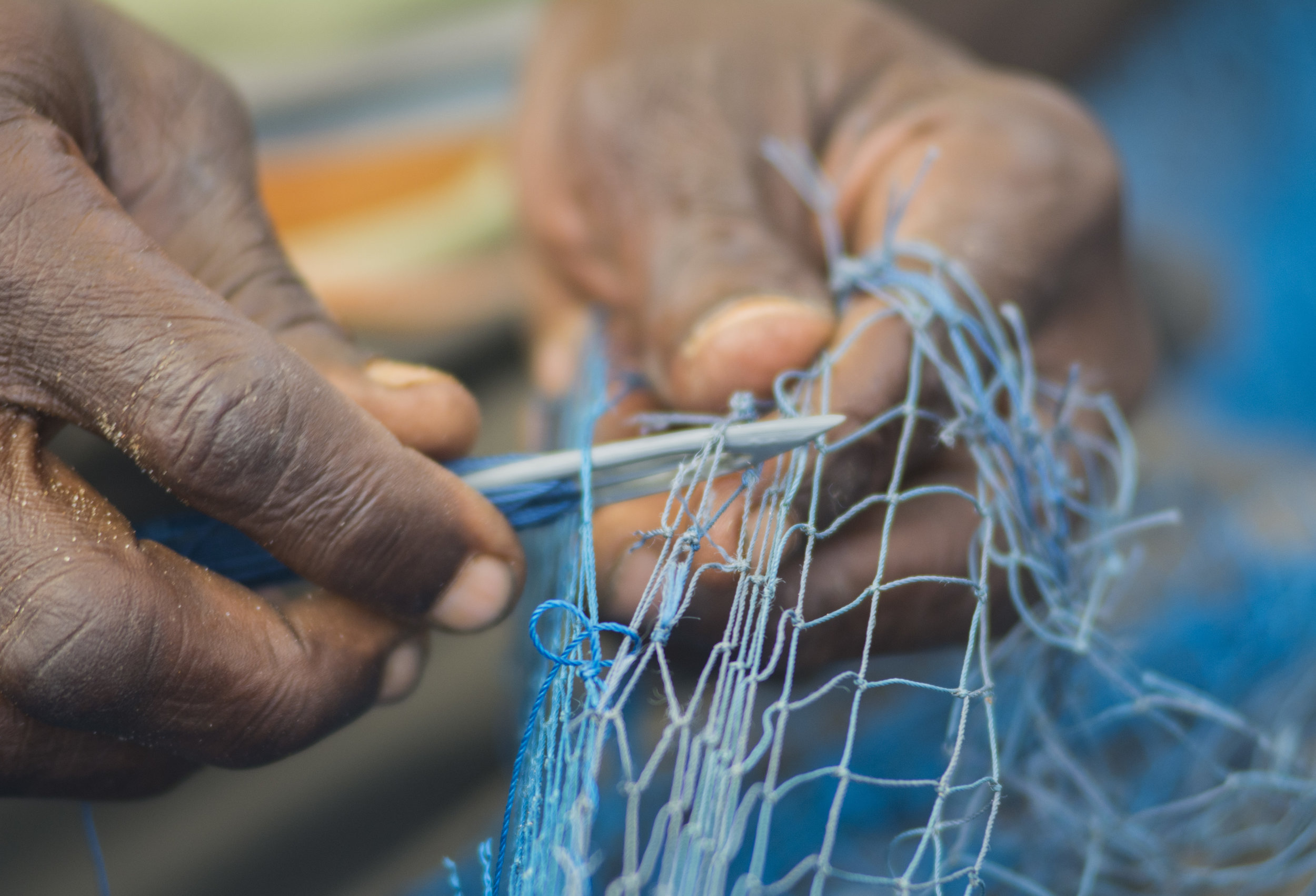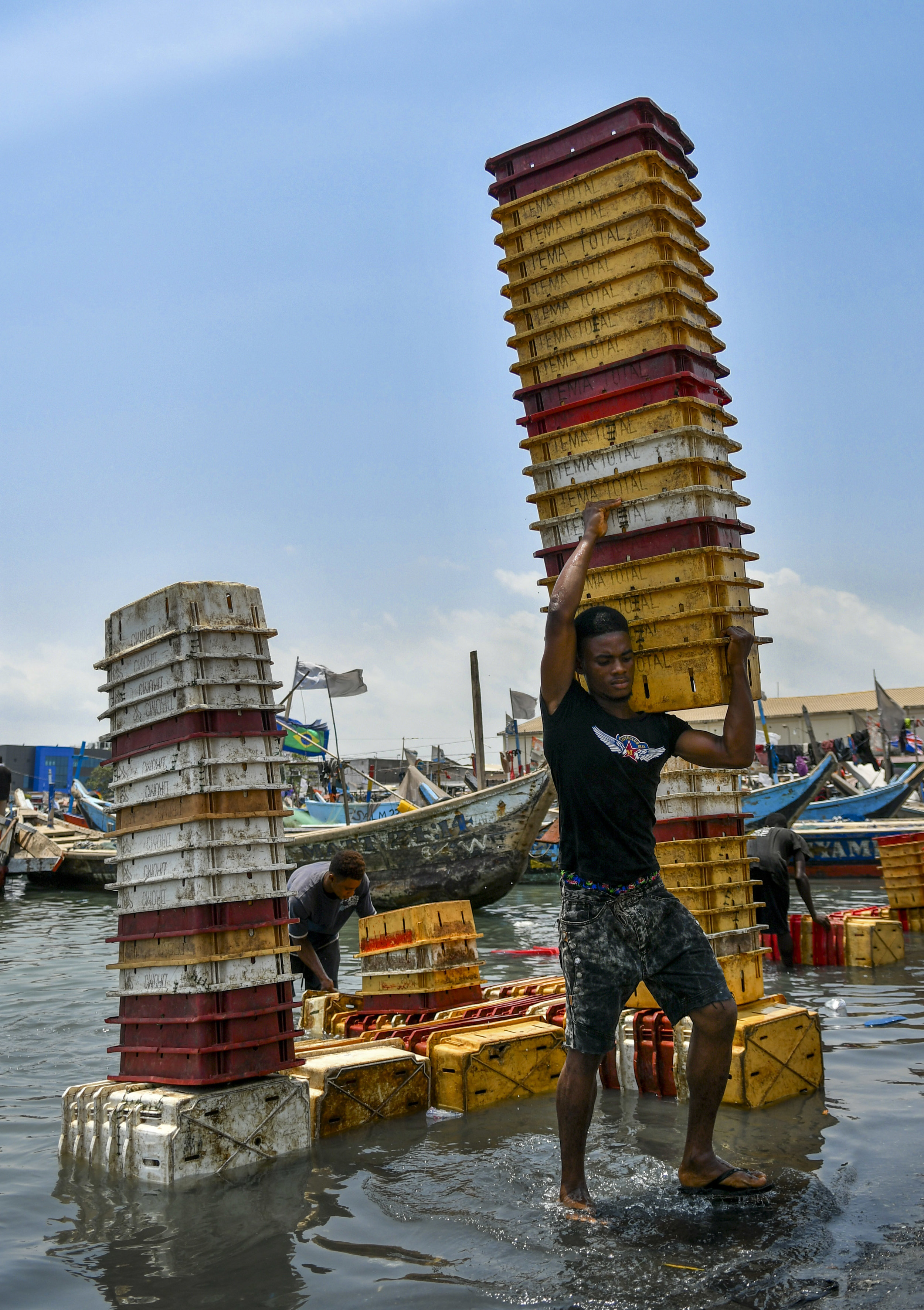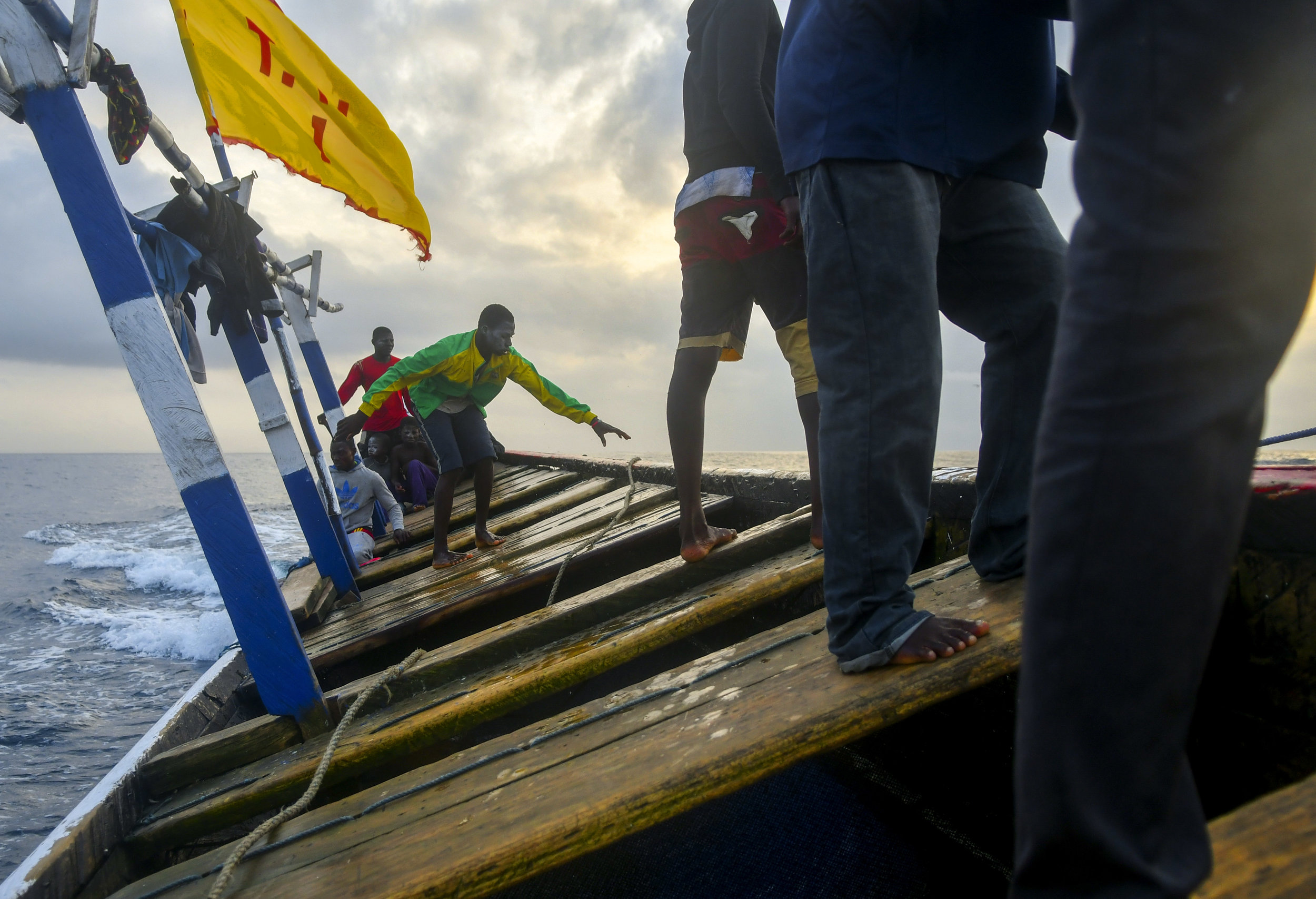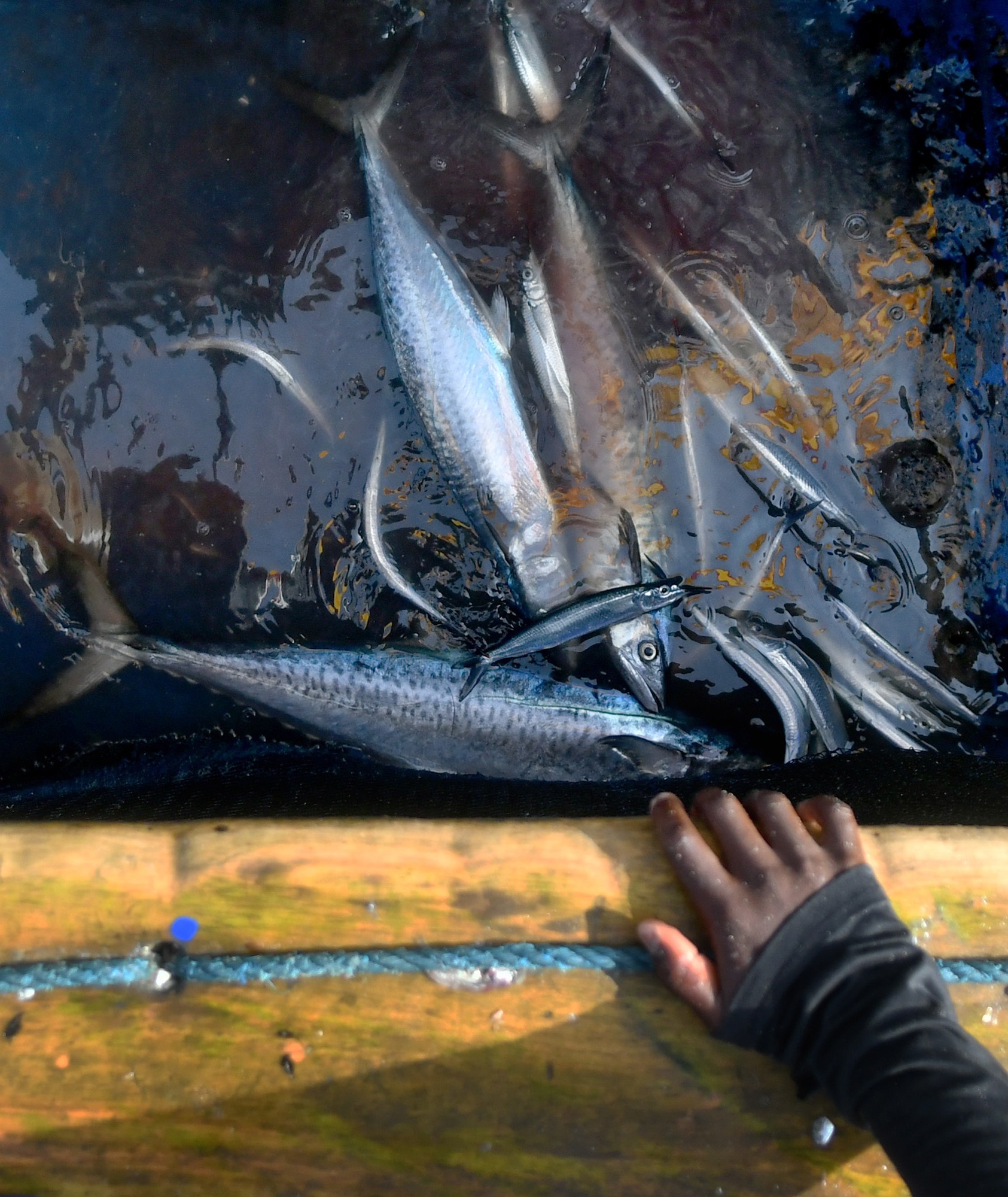In the pitch black, sticky nighttime air, Chief Nii Kukurundu strides barefoot through the winding alleys of his fishing community.
It is 4 am, and Choko Beach’s only source of light is a towering bonfire on the sandbank. Most people are asleep in their homes or on benches in the warm night breeze, but the fishermen move along the beach gathering supplies. Their carved wooden canoes wait, bobbing in the dark waters a few hundred meters away as some men swim out into the black ocean to bring them back to the beach. One man walks the shore in silence, following one canoe’s path along the horizon. Every so often he pulls out his phone to wave the flashlight at them, signaling land.
Illuminated by the bonfire, the fishermen methodically prepare for launch like they do every day. Wading out knee-deep, they guide the canoe forward before jumping in barefoot onto the slick wood surface. A young teen takes up the motor in the back, and the men began their journey away from the flickering bonfire and onto the dark salty waters.
Men and boys prepare the boats and themselves for the morning fishing trip. Supplies are loaded into canoes and prayers are spoken on the shoreline.
“As long as there has been Ghana, there has been fishing,” Said M F Takey, president of the Fishing Ministry. Takey was a fisherman for 36 years before overseeing all fishing that takes place in Ghanaian waters. Now, he works to preserve the fishing resources in Ghana for generations to come.
Fishing in Ghana is a culture to itself. In some families, it’s a generational profession. it’s the community you are raised in, your parents were raised in, and your grandfather. Everyone knows the fishing community culture. For example, on Tuesdays, it is taboo to even look at the sea. Traditional beliefs reserve Tuesday as a day of rest for the sea goddess, so she may give birth to more fish. Fishermen will work fixing their canoes or repair nets on this day, but will not touch the water. This tradition dates back to the very first fishermen of Ghana, preventing overfishing and preserving Ghana’s resources. “Ghana is one of the main countries which consume fish, so fishing is very, very important here. We consume fish more than meat.” Says Tetteh, a member of the fishermen’s committee in Tema, Greater Accra. Ten percent of people in Ghana are involved in the fishing business, and fish makes up 60 percent of meat in their diets.
From here the fishermen start up the outboard motor and drive directly to shore. As they reach the shore, the boat is swarmed with people – money and baskets in hands – ready to buy the fish. One man leaps into the storage hold and begins bailing buckets full of anchovies and sardines into their baskets. Each buyer clamors over the other to get the best catch. Within minutes, all the small fish are sold off and the large fish are stored to sell on another beach. With pockets full of cedi’s, Ghanian currency, the men push away from the shore.
TYPES OF FISHING
“We fishermen, we do this with our old system, the way our fathers did it.” Says Said Adjierteh, a canoe owner in Tema. This industry is deeply rooted in tradition and family history.
Ghana has three kinds of fishing – industrial, marine artisanal, and inland canoe fishing. Some fishermen also cast their nets from the beaches and sometimes hunt with bow and arrow.
Industrial and marine artisanal fishermen fish the ocean. They may sail up to 300 nautical miles and for five days looking for a fishing site. The industrial fishers do deep-sea fishing and catch larger fish like tuna, sailfish, or the occasional shark. Artisanal fishing is practiced at Choko. It utilizes carved wooden canoes with outboard motors to travel up and down the West African coast, as far north as Guinea and as far south as Cameroon.
Fishermen in Ghana live a nomadic lifestyle, following the fish. “We have so many people here, on land and on sea,” said fishermen Adjierteh. Many fishermen will travel up the coast and build a temporary home in a different country if there is good fishing there. Sometimes these men will settle down for over a year if the fish are plentiful. Their catches are smoked, then shipped back to their family and hometown every few weeks for consumption and sale.
As the fishermen push through the breaking waves, they began passing around a white powder, taking turns coating their faces in it. This is a ritual they do every morning for a good catch. After applying the powder, the captain prayed to God and to the sea for a bountiful catch. The fishermen bowed their heads for a moment, and the canoe motored on to the first location.
THE CATCH
After an hour of sailing, the canoe from Choko approaches the fishing site. The captain stands tall at the front with two other elders, all squinting into the distance, scanning the waters for an unknown signal from the fish. He shouts to the man at the motor, pointing him to the perfect location. Here is where they will cast their nets.
They drop one end of the net and begin to make a wide circle, unfurling the enormous hand-woven nylon web. The birds above begin to circle, as well. They know that a meal for the fishermen also means a meal for them. They close the net like a giant drawstring bag, trapping the fish up inside. The men divide in half and begin to pull the ends of the net in, chanting and singing to the rhythm of their tugs.
As they pull, the fishermen smack the net against the edge of the boat, sending fish flying back into the net, the boat, the air, and the sea. Saltwater and fish guts coat the floor of the canoe, which wobbled at a 45-degree angle towards the sea from the tremendous weight of the net. The youngest boys took turns helping to pull and bailing water. On the canoe, father and son pulled on the rope together; father steadily pulling in the net as he has done his whole life, with his enthusiastic son strained against the rope with all his might – both pulling along to the rhythm of their song. Gulls dived at the boat constantly, snatching up the flying fish as the fishermen pulled in the slick net with all their strength, singing the whole time.
From here the fishermen start up the outboard motor and drive directly to shore. As they reach the shore, the boat is swarmed with people – money and baskets in hands – ready to buy the fish. One man leaps into the storage hold and begins bailing buckets full of anchovies and sardines into their baskets. Each buyer clamors over the other to get the best catch. Within minutes, all the small fish are sold off and the large fish are stored to sell on another beach. With pockets full of cedis, the men push away from the shore.
FAMILY
Fishing can employ everyone in the community, regardless of age or gender. On the ship this morning was three children fishing. The youngest child on the canoe, Bernard Mate Butu, is 9 years old and accompanying his father. The pair stayed together while at sea, the father always close enough to shout to his son when he wasn’t pulling his weight and to praise him when he did the job well.
The boys jumped in and out of the water as the canoe drifted through the sea, to either untangle nets or just cool off. The boys were able to make a game out of everything, swimming along and dancing as the rope was pulled, but they still worked tirelessly pulling nets and bailing water along their elders. Fishing in Ghana is a generational profession, and a long lineage of fishermen decides the fishing chiefs and earns the admiration of others in the community. For the chief fishermen of Tema, Chief Shedutshe is the leader and commands the utmost respect. “This very man is my Grandfather.” Says Chief Odametery II. “He is our Lord, of all the Chief Fishermen.”
Although fishing involves everyone, there are no women on the canoe from Choko this morning. It is considered taboo for women to go into the sea to fish, but they play a vital role.
“Without them, you work for nothing,” Takey said. The women in the fishing community are in charge of everything that happens to the fish after it reaches the shore – smoking, frying, distributing, and selling.
At Choko, two women stand behind a tower of wood and racks of fish defrosting and waiting to be smoked. These fish need to be smoked and cured today, or they will spoil. After being smoked the fish can stay good for up to a year and is shipped all across Ghana and neighboring countries. Hentryte Athile was born in Choko, and she says the fish they are smoking are imported tuna because it is not the season in Ghana for tuna. It is very expensive to import the fish, but Ghana consumes so much that there is a deficit and the country is forced to import to meet their needs.
“If our catch is insufficient, the government spends a lot of money to import more fish. So if we invest more in the fishing industry in Ghana, you are saved from spending a lot of money to import from outside.” Says Adjierteh.
Araba Kwaicwiwaa sits in the shade of the raucous Tema fish market. She and hundreds of others sit at this market selling fish caught from the crashing waves a few meters away. Today, she is selling Sea Tilapia, Emuley, and Tuna. She purchased these fish this morning for 800 GHS (Ghanaian Cedis) and hopes to sell them for at least 850 GHS. Kwaicwiwaa is 55 years old and has been selling at Tema for 5 years. Sitting at her own stand a few feet away is her daughter, Maame Akua, who is 22. Around them scurry toddlers the mother’s brought to work with them.
The fishermen’s council hopes to open a school in Tema, so the kids have somewhere close to go while the fathers are at sea and the mothers are at the market. “If they would come here, they could learn,” Adjierteh says. He says the fishermen don’t have time to travel to maritime schools, but many wish they could.“It is the attitude of the local fishermen, ‘If I’m going there, who is here taking care of the family?’” The fishermen’s committee of Tema hopes a local school will provide the opportunity for people to learn the new ways of fishing when they’re young, without having to travel.
TEMA
Tema is the largest port in Ghana and a major fueling station for any ships on the West African coast. The industrial section of Greater Accra, Tema is crowded with enormous factories for cocoa, fish canning and preservation, and other food packaging plants. Here is where most of the fish are sold fresh, smoked, stored on ice, or sold in bulk. The sprawling and bustling market at Tema is a central point for restaurants and local businesses to buy the freshest fish.
The port rests in the shadow of an oil refinery – a crucial part of the fishing industry. Ships carrying oil scatter the horizon alongside the wood canoes with outboard motors they provide the fuel for.
Ashitey Tetteh is a member of the Tema fishing committee and a canoe owner – an esteemed title in the fishing community. He rests in the shade under brightly colored sails, where the smell of fish and open barrels of petrol clash. Huge drums of oil are rapidly mixed and sold off to the shouting crowd clamoring around the refueling station.
“Fuel is key,” he emphasized.” It is the center of the business.”
The fuel was delivered last night on two trucks, carrying 3,000 gallons of fuel each. By noon the next day, it was all sold. “The men have the money to buy the fuel, but sometimes it's not there.” Said Tetteh.
His canoes usually leave shore with about two drums of fuel – roughly 20 gallons of petrol. Trucks visit every few days delivering hundreds of gallons fuel, but it is not enough. Tema is a major refueling station. But when there isn’t enough fuel, the fishermen need to travel farther down the coast and dock several times in pursuit of petrol. “If you don’t have sufficient fuel, maybe I can bypass you, and go catch.” Said Tetteh.
The fishermen hope the government will do something to solve this problem. The government currently subsidizes some fuel and motors for the fishermen, but they hope for more and need refueling stations. With more fuel, the fishermen would be able to catch more fish more efficiently, increasing the supply and lowering Ghana’s reliance on imported fish. The fishermen argue more fuel would also create more jobs.
“We consume fish a lot in Ghana, so the question is, what is the government’s investment in the fishing?” Says Tetteh. The Chief Fishermen of Tema and the Fishing Ministry push for education to advance the business and help fishermen.
LAKE FISHING AND AQUACULTURE
Fishing occurs on all waterways of Ghana, and lake fishing is crucial to providing fish and preserving resources. Lake Volta is one of the primary locations for artisanal lake fishing and aquaculture. Lake Volta is the largest man-made reservoir in the world and contains the Akosombo Dam, which used to provide 100 percent of Ghana’s electricity. This lake spans more than 8,502 square kilometers (3,283 sq mi), and the inlets and marshes along the lake are home fishermen of all kinds.
Kpong Harbor is one of these homes. Jutting into an overflow of Lake Volta, where the still water and overgrown lilies create a lazy peaceful atmosphere, this small fishing community rests under the sun. Only a few canoes here are fitted with outboard motors, whose quiet whirrs can be heard in the distance. Many of the fishermen here still paddle by hand, taking a long time to travel to the open lake.
Michael is 28 and began fishing after he finished high school. He rests in the shade of a thatched roof stall a few meters from the still water overrun with weeds. Because of these weeds, many fishermen stay in the shallows to wade through the reeds and water lilies with a bow and arrow. They are forced to fish like this – the fish hide in the plants where the nets get tangled and cannot trap them. Michael shows off this morning’s catch of 6 tilapia – this will sell for about 70 GHS, about $15.
James and Godwin returned from a morning of lake fishing with their catch at their feet and quietly parked their canoe between two hulking green pieces of machinery that look like giant tractors. The government provided these to remove the weeds. “These machines cannot do anything!” James said as he waved his hand at the machines in disgust. He said he and a team of men go out and manually chop down all the weeds.
Unlike Tema or Choko, these fishermen are not part of an official fishing community. In order to get government assistance, each community must form a five-person committee, including the chief fisherman. This is part of the Fishing Ministry’s effort to prevent illegal fishing. After that, it only takes one week for the ministry to visit and determine what they need, as far as fuel, motors, or trash collection. However, because the fishermen’s lives are nomadic, some are wary about forming a committee, because they don’t stay in one place. “It doesn’t matter where you live, you are here to help the community.” Said John*. John works for an oil refinery in Tema, and is the Distribution officer in charge of Premix fuel; he provides better access to fuel to nearby communities.
Aquaculture is being expanded on Lake Volta as a sustainable solution to the fish deficit in Ghana. Currently, almost half their fish supply is imported, which gets very expensive. Moses used to be an artisanal fisherman across the lake from where he now works at a fish farm. Here, they farm Tilapia, which are full grown and ready to sell in about 6 months. They sell to customers all over Ghana, for about the same cost as wild caught fish. A recent ecological study was conducted on aquaculture in Lake Volta and concluded there was no impact on the surrounding environment, meaning that next to Ghana’s enormous sustainable power source might lie a sustainable option to the fishing deficit.
However, serene Lake Volta is not immune to problems. Global climate change has made the lake levels rise, which caused two of the four turbines to no longer work at full power. The dam that once provided 100% of Ghana’s electricity is now failing, leading to blackouts on the grid. And rising temperatures could affect the aquatic habitats these fish, and the fishermen, need to survive.
ENVIRONMENTAL IMPACT
“Climate change is natural. If you can’t see it, you can’t see.” Said Takey, the president of the Fishing Ministry. In Ghana, climate change is already felt. “Now, we are having so much heat! Before, we never had heat like this at this time,” Said Takey. But it’s not only the temperature rising. The sea level is rising, chopping off the land and beach communities. “Areas where we think we have beach and you can go – now you cannot. And it’s changing everything.” Said Takey. Sea levels are rising faster in West Africa than the global average, and some places lose up to 100 feet of land per year. For the communities whose livelihood is the sea, and a country who depends on the sea for 60% of their diet, this can dramatically shape the physical and political landscape of Ghana over the next decade. “Definitely, this will affect the industry.” Says Takey.
“Climate change is affecting everybody. You don’t have to be blind and wait for it.” Says Takey. He waved his hand dismissively. “They are always shouting, going to UN to sign this, others have not signed it – we have endorsed it already.” President Takey and the Fishing Ministry support policies and regulation to protect the remaining beaches from the changing climate and overfishing.
The fishermen are mindful to not overfish an area. Most fishermen, along lakes, rivers, open ocean or in governmental office, value the delicate fishing ecosystem and are careful not to overfish to preserve species. The tradition of no fishing on Tuesdays helps to limit some of this. “It takes 20 years to rebuild a species,” Takey says. He is working to preserve the resources fishermen have been making their livelihood off of for generations, for generations to come. The Fishing Ministry has cracked down on unregistered fishing with new policies and hefty fines for unregistered fishermen. The implementation of fishing councils in each community is a starting point for the government to help provide fuel and other supplies and helps to prevent the illegal unregistered fishing that is detrimental to the whole fishing economy.
However, there is competition in the waters. “If you go to sea, you see that if you’re not careful, you might get into someone’s area.” Says Takey. The fishermen frequently overlap fishing grounds on all of coastal West Africa, and heavy encroachment from EU and Japanese trawlers dwindles their fish supply.
“Some time ago, my friend said ‘Sea never dry.’ So: you don’t have to worry yourself about controlling what is in the sea. The sea will replenish itself.” Explains Takey. This is still the mentality of many fishermen – Tetteh’s canoe inscription also reads “sea ever dry,” and many variations of this are found decorating the wooden ships.
“But,” Takey continues, “It depends on the various characteristics that existed – the level of salt in the water, the frequency of the waves and the strengths of your waves, a few other effects.” He says these reasons for enforcing new regulations are more difficult to communicate and enforce than the traditional beliefs surrounding the sea goddess and how she provides.
“There is change everywhere.” Said Takey. He and the Fishing Ministry are providing new policies to support the traditional forms of fishing that have existed for generations and to preserve the culture and precious resources for generations more. “The whole world is changing, and the industry has to follow the trend. And if you want the industry to progress, then you have to plan, in tandem, try to follow what is going on, and find solutions to it.”
